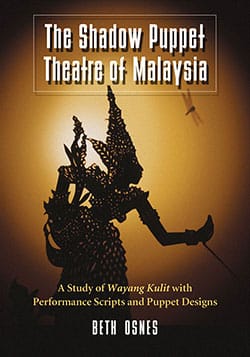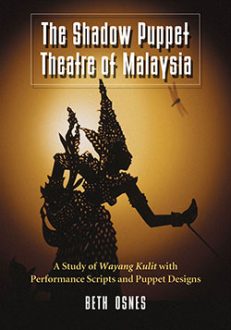The Shadow Puppet Theatre of Malaysia
A Study of Wayang Kulit with Performance Scripts and Puppet Designs
$49.95
In stock
About the Book
This comprehensive book explores the Malaysian form of shadow puppet theatre, highlighting its unique nature within the context of Southeast Asian and Asian shadow puppet theatre traditions. Intended for a Western audience not familiar with Asian performance and practices, the text serves as a bridge to this highly imaginative form. An in-depth examination of the Malaysian puppet tradition is provided, as well as performance scripts, designs for puppet characters, instructions for creating a shadow screen, and easy directions for performance. Another section then considers the practical, pedagogical, and ethical issues that arise in the teaching of this art.
About the Author(s)
Bibliographic Details
Beth Osnes
Format: softcover (7 x 10)
Pages: 204
Bibliographic Info: 46 photos, 34 illustrations, appendix, notes, bibliography, index
Copyright Date: 2010
pISBN: 978-0-7864-4838-8
eISBN: 978-0-7864-5792-2
Imprint: McFarland
Table of Contents
Acknowledgments ix
Preface 1
Introduction 7
One: The Shadow Puppet Theatre in Southeast Asia 13
Two: The Stories of the Malaysian Shadow Puppet Theatre 32
Three: The Shadow Puppet Theatre in Performance 51
Four: Five Scripts 94
Five: Teaching and Performing Malaysian Shadow Puppet Theatre 139
Afterword: July 2008 157
Appendix: Puppet Designs Used in Scripts 169
Chapter Notes 183
Bibliography 187
Index 193
Book Reviews & Awards
“Demonstrating the skills of a seasoned storyteller, Osnes weaves a heartfelt narrative with scholarly research into the cultural history of Wayang Kulit, attending to the technical details of its performance while observing the communal spirit and traditional values of the art form’s original practitioners”—Theatre Journal.





